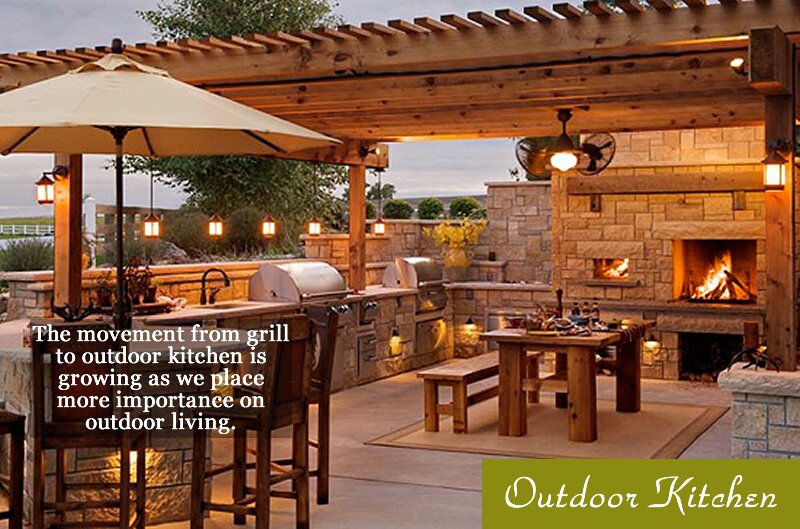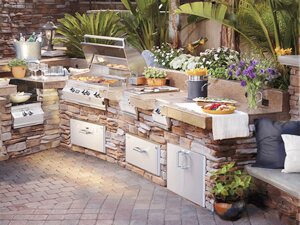 Increasingly, cooking outdoors has evolved into an elaborate ritual. Often, an entire kitchen is constructed outside, complete with appliances, prep stations, multiple cooking areas and storage space. With the popularity of the kitchen as a gathering place, it seems only natural that the outdoor kitchen would become the hub of the outdoor living area.
Increasingly, cooking outdoors has evolved into an elaborate ritual. Often, an entire kitchen is constructed outside, complete with appliances, prep stations, multiple cooking areas and storage space. With the popularity of the kitchen as a gathering place, it seems only natural that the outdoor kitchen would become the hub of the outdoor living area.
When planning an outdoor kitchen, carefully consider placement, use, climate and budget.
Placement
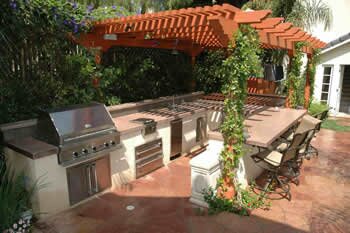 While all of the above work together in the planning and design process, the first thing to consider is where you will place your outdoor kitchen. A location close to the interior kitchen is often a good idea, as there will be a lot of traffic between the two. Transporting food, beverages, plates and utensils is more efficient if the two kitchens can be located close together. Certainly, if including a sink or multiple cooking areas is not in your plans, you will want to keep these areas in close proximity. As you incorporate more appliances and protected storage into the plans, distance becomes less of an issue.
While all of the above work together in the planning and design process, the first thing to consider is where you will place your outdoor kitchen. A location close to the interior kitchen is often a good idea, as there will be a lot of traffic between the two. Transporting food, beverages, plates and utensils is more efficient if the two kitchens can be located close together. Certainly, if including a sink or multiple cooking areas is not in your plans, you will want to keep these areas in close proximity. As you incorporate more appliances and protected storage into the plans, distance becomes less of an issue.
Use
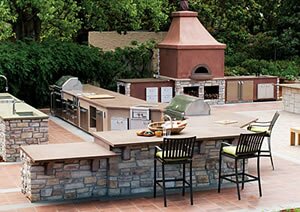 Who will use the outdoor kitchen, how it will be used and how often it will be used will all effect your decisions. If entertaining is an important part of using your outdoor kitchen, you must include seating for enough people to accommodate your typical gathering size. As in the interior kitchen, the chef does not want to be isolated while everyone else is happily socializing in a removed area. Incorporating a counter with barstools is a convenient way to add seating, prep space, and as a barrier to keep traffic out of your work space.
Who will use the outdoor kitchen, how it will be used and how often it will be used will all effect your decisions. If entertaining is an important part of using your outdoor kitchen, you must include seating for enough people to accommodate your typical gathering size. As in the interior kitchen, the chef does not want to be isolated while everyone else is happily socializing in a removed area. Incorporating a counter with barstools is a convenient way to add seating, prep space, and as a barrier to keep traffic out of your work space.
If you plan to continue to cook a good part of the meal in the house, then you won’t need to add additional cooking areas like burners, roasters and warming ovens. On the other hand, as culinary interest increases, so does the interest in adding these things and more. Pizza ovens, wood-fired ovens, smokers, wine chillers and beer taps are becoming more popular in high-end outdoor kitchens.
Climate
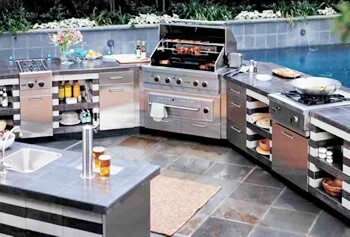 An outdoor kitchen must include appliances and materials that will withstand the weather. In many areas, the climate is a major consideration and it is necessary to plan for it. Winterizing your kitchen and protecting any plumbing lines should be addressed up front. Likewise, if you are on the coast, you will need to consider the effects of salt air on your appliances and cabinets.
An outdoor kitchen must include appliances and materials that will withstand the weather. In many areas, the climate is a major consideration and it is necessary to plan for it. Winterizing your kitchen and protecting any plumbing lines should be addressed up front. Likewise, if you are on the coast, you will need to consider the effects of salt air on your appliances and cabinets.
Stainless steel is durable in coastal areas, but having a way to cover or close up the appliances is a good idea. Countertops that are made of a solid surface will not only be easier to maintain from a cleaning standpoint, but will not be subject to the issues of grout cracking with wet, freezing temperatures.
Budget
 Inside or out, a kitchen can be an expensive proposition. A realistic budget should be set in the beginning or you may find yourself in trouble later. Honestly evaluate your lifestyle and how you will use your outdoor kitchen to help keep you on track.
Inside or out, a kitchen can be an expensive proposition. A realistic budget should be set in the beginning or you may find yourself in trouble later. Honestly evaluate your lifestyle and how you will use your outdoor kitchen to help keep you on track.
In the long run, it is wise to invest in the best quality materials, appliances, and furniture you can the first time around. It is frustrating, as well as costly, to have to re-do something due to poor quality or poor planning. Consulting with experts who are knowledgeable in their respective fields will save time and money and often bring to the table ideas and suggestions you had not considered.
Ultimately, the more you use your outdoor kitchen, the more of a value the cost becomes.
Have questions on the essentials of outdoor furniture and accessories? Just ask we'd be glad to help.




